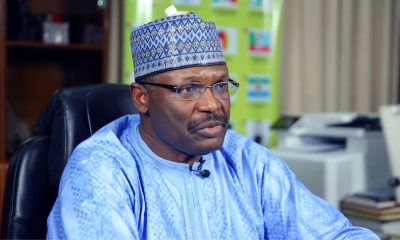Opinion
Rebuilding PH For Generations
Chima Aaron
When I was told by a friend whose wife had been told that part of their house has been marked for demolition, I replied if that was the bargain the people had with the Governor. This was sometime in 2008.
Then in March 2009, I visited Nigeria, usually through Lagos to Port Harcourt where I had a firsthand witness of the demolition exercise and the Governor’s intentions for Port Harcourt, the only Garden city of Nigeria.
For example, the demolition of late Dr. G.B. Leton’s fence in G.R.A.Phase 2, brought me memories of the eighties, when we used to standby to admire the fine architectural design work of the building and many others that were later taken over by high rise fences.
It will only take the imaginations of “an old Port Harcourt boy” to have an insight into the Governor’s present efforts that need everybody’s support to turn the city back to its original status. If the creators of Port Harcourt should see it as it is presently, they’ll really be disappointed.
Who is “an old Port Harcourt boy”, shortened for “an old boy”. He is anybody who at one time or another lived as a boy in Port Harcourt from its’ creation to 1967 when the Nigeria civil war started.
“An old boy” prefers taking the backyard shortcut instead of the main roads to school and errands because they were kept clean as the main roads with flowing gutters and no foul smell. There were men paid to see to the cleaning of the gutters and to cut the grasses.
If these men should have reason to file report of your dirty premises to the sanitary authorities and a letter of inspection is sent to you, a day before the date will be used by the tenants for general cleaning. On the day of the inspection, you will clearly notice the panic on the faces of our parents before the sanitary inspectors and their big hats.
“An old boy” on a dry evening with friends may choose to lie either in the courtyard or the front cement pavement, telling stories without fear of mosquitoes or rats.
Above, are the experiences of the Garden city for you. It was designed in the form of a garden by the British who stationed men to manage the planning and maintenance of it until at our independence in 1960 when it was handed to us. We continued like them until 1967 at the outbreak of the Nigerian civil war, when the process broke down.
The problem started when the Rivers State government, after Eagle Island and G.R.A.Phase 2, abandoned planned design development of the city to land owners and private developers who built and fenced their properties, according to their plots.
From the Chief Rufus Ada-George to Dr. Peter Odil’s governments, for reasons to decongest the city, created roads for expansion without planning. With these roads, the land owners started selling to individuals who started building along the roads. And secondly, the increased activities relating to the petroleum industries, brought about inflow of people into the unplanned city, from other parts of the country.
These two factors created the over congestion and the “nightmare” traffic holdups. Let me use this experience as an example. From my Stadium Road base, I, at 3p.m left for an appointment with an office that closes at 6 p.m along Olusegun Obasanjo road. I could not make the appointment for that day. I am not condemning the plans the Government has, but rather to add onto it.
Let us create five development areas from:
Eleme junction, Onne, to Bori road, Oil-Mill junction to Imo River Bridge (Oyigbo),Uniport, along Emohua to Ahoada, Rumuokoro junction to Omagwa to Isiokpo, and Iwofe, Bakana, Borikiri, Isakato Tombia swamps for sand filling and latter converted for reserved areas.
The Government can pass laws to prevent these areas from sales and development without government approval. The best way to development is on the long term, say a twenty year development plan of these areas or zones. This is an idea to decongest the city.
The government can start the experiment from any of the five zones depending on available resources.
Take for example, the size of the area known as “the New-lay-out” which is to covers say from the Plaza Cinema, Enugu Street, the Town Market, Central Cinema, through Ibadan, Bishop Johnson, King Jaja, Churchill and Morehouse Streets to the end of Capt. Amangala, Harold Wilson and Ndoki Streets.
The government can photocopy the design of the New-lay-out, even add Creek, Bonny, Niger, Bende and Victoria Streets, Aggrey Road, King Amachee Road area, and design any of the five zones it wishes to start with in that way.
It will provide all the infrastructures found in the existing photocopied areas, like Schools, parks, hospitals, Post Office, Police Barracks, Roads, street lights, water, markets, drainage systems, cementry, churches, mosques etc.
It is the government that will approve the type of design for the buildings. I suggest that three quarter of the area should be shared in double plots of 1 00×1 00, while the remaining one quarter should be plots of 50×100. All these should be done by the government after marking and construction of secondary/ principal roads (with enough parking space) and footwalk areas. The footwalk, parking space and roads should be wider, considering the large population of people.
For the 1 00×1 00 plots, the government should insist on four stories commercial block of flats for renting like we have in Onitsha. Then the 50×100 for individuals for personal homes. We waste land by building bungalows, instead of high rise buildings. Backyards should be used for court yards without passages.
After all these have been put in place, the government can now ask land owners to start selling their land according to plots to only investors that can demonstrate proof of having money to start developing immediately. This is where our banks are supposed to take over but unfortunately they don’t invest much on this sector of real estate.
The government can also approve the design of the blocks of flats or design them itself by having stores on the ground floors.
This plan if properly executed continuously will decongest the city.
The Rivers State Government can seek the assistance of the Federal Government for projects of this nature because it has Port Harcourt among its territories for development.
A Ring road with two or three lanes on both sides, round Port Harcourt, would link all the in and outlet roads of Port Harcourt to it. So that a lorry coming from Aba, heading to NPA, does not have to follow Aba road but to divert through the Ring express road to N.P.A. So also anybody going out of the city doesn’t need to take Ikwerre or Aba road, but to go out through the Ring express road.
Infrastructures are supposed to last for centuries, this is the more reason we should be very careful of our source. They maybe cheaper but at the long term, are they worth it?
For example, let’s look at the Fly Over Bridges/Roads in Lagos and the Aba road express road constructed by Julius Berger(Lagos) and Guffanti (PH) they are very sound except for lack of maintenance problems. We should always go for the best when it comes to putting up infrastructures that will need our remembrance by generation to come.
Opinion
Humanity and Sun Worship

Opinion
When Global Peace Hangs In The East

Opinion
Balancing Religious Freedom and Community Rights

Quote:”Communities have rights to peace, safety, and quality of life. Noise pollution, crowds, or other impacts from religious activities can affect these rights. Balancing these interests requires consideration and dialogue”.
-
Politics1 day ago
2027: Bayelsa APC Adopts Tinubu As Sole Candidate … As Lokpobiri, Lyon Shun Meeting
-
Sports1 day ago
GOtv Boxing Night 34 holds Dec. in Lagos
-

 Politics1 day ago
Politics1 day agoAlleged Smear Campaign Against Yakubu, CSOs Demand Apology From Uzodimma
-
Politics1 day ago
2027: Jega Condemns Premature Campaigns, Blames Elected Officials
-
Politics1 day ago
Why INEC Can’t Punish Politicians For Early Campaigns – Yakubu
-
Sports1 day ago
WCQ: NFF Denies Post Match Statement
-
Politics1 day ago
Stopping Natasha’s Resumption Threatens Nigeria’s Democracy – ADC
-
Sports1 day ago
Gov. Decries Delta’s Poor Performance At 2025 NYG

